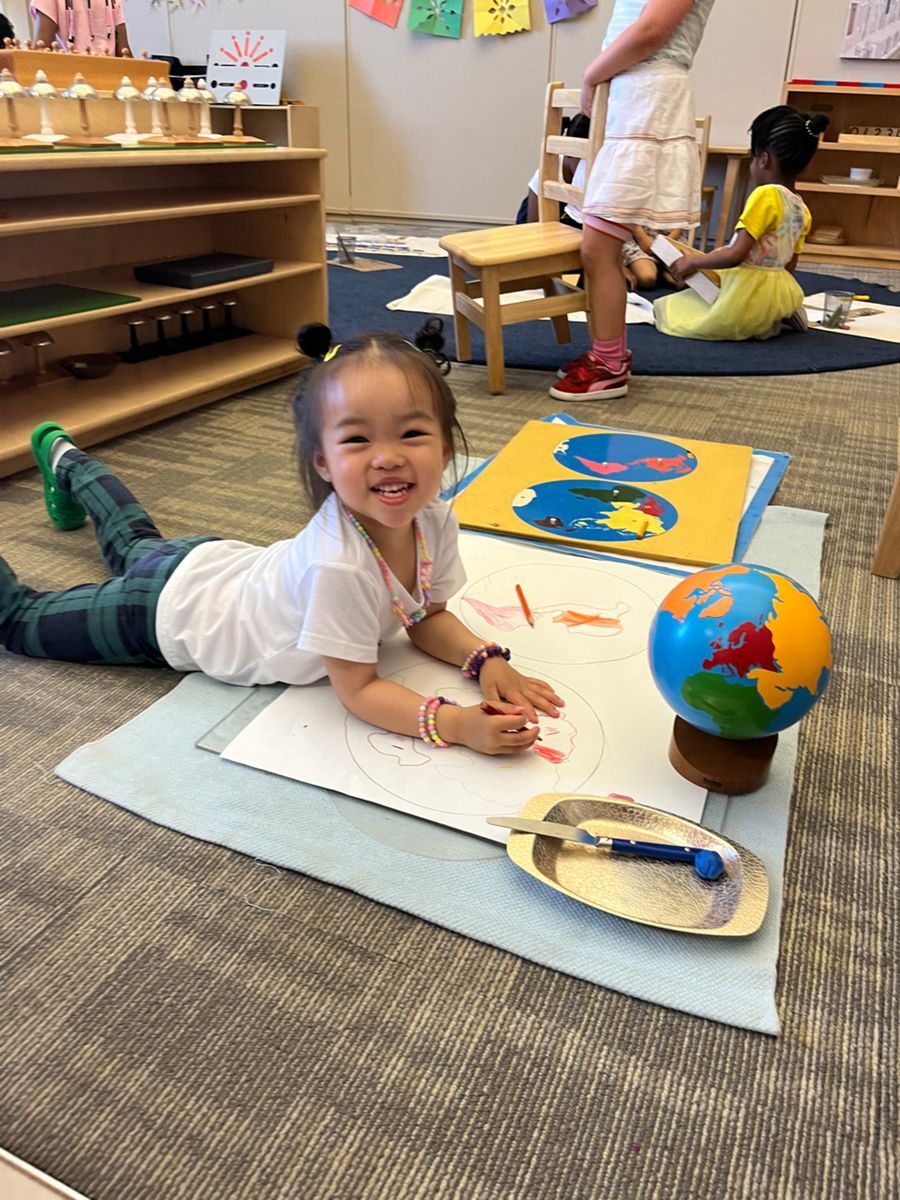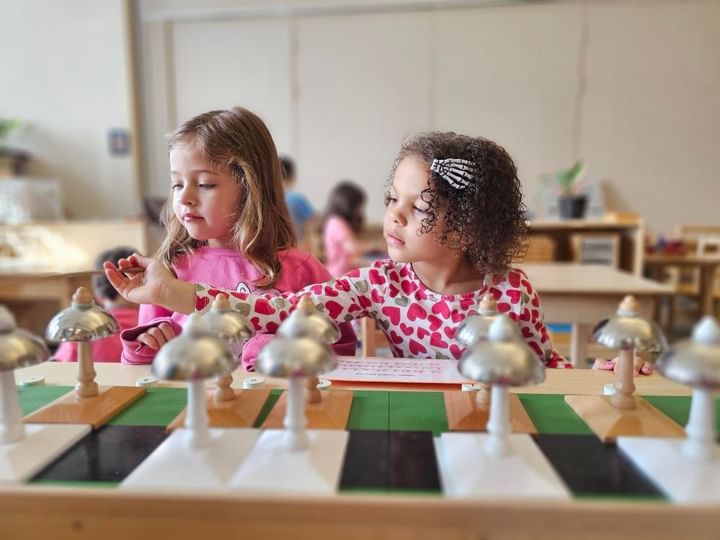Children's House Curriculum
Ages 3 - 6
Children's House Curriculum
Children in our Children's House Community have exposure to six key areas:
Practical Life:
Exercises and activities that children observe in daily life. These activities develop children's independence, coordination, concentration, and fine and gross motor skills. These lessons inspire your child with real-world, purposeful tasks and tools, helping to see themselves as capable and competent.
Sensorial:
Activities that teach children to refine their senses of touch, sound, smell, and taste so that they are able to organize sensory impressions and their understanding of the world. Children this age use their senses to explore the world. They enjoy the beautiful sensorial materials and learn to compare and contrast, to discern slight differences, and to build internal order.
Language:
Our thoughtfully-planned classroom environment encourages growth in oral language, written expression, reading, and grammar elements. The approach to reading instruction is phonics-based and highly sequential, with additional accommodations adapted to different types of learners. Children are taught through manipulative materials that allow them a great deal of autonomy
Mathematics:
We use concrete materials to represent all types of quantities to engage your child in the basic operations of mathematics. We use combining, separating, sharing, counting, and comparing.
Using carefully prepared tools and manipulative materials, children are led through a logical mathematical thought process— from concrete to abstract – to understand concepts like linear counting, the decimal system, addition, subtraction, multiplication, and division. Your child will learn to love math the Montessori way!
Culture:
Multicultural studies lay a foundation of mutual understanding by exposing children to geography, history, physical, and life science basics. Children gain an awareness of the world around them by exploring other countries, their customs, foods, languages, and wildlife for example. Capitalizing on the young child’s propensity for language acquisition, Spanish language and culture is integrated into the prepared environment through individual and small group instruction utilizing hands-on materials, conversational interaction, songs and literature.
Grace and Courtesy:
Grace and Courtesy lessons are essentially teaching the children what it means to be polite and how to appropriately communicate their feelings. These lessons are often demonstrated through role-play given by the teacher and students who are willing to demonstrate their etiquette (the children are always very entertained by these lessons!)
Practical Life Examples
Pouring Grains
Pouring Liquids
Using a Funnel
Carrying A Tray with Something on it
Unrolling and Rolling a Floor Mat
Folding Cloths
Spooning
Opening and Closing Containers
Stringing Small and Large Beads
Nuts and Bolts
Screwdriver
GeoBoard
Lacing Cards
Weaving
Braiding
Puzzles
Tangrams
Matryoshka Nesting Dolls
Peg Board
Tongs
Chopsticks
Walking on the Line Activities
Rhythm
Silence Game
Snap frame
Small Button Frame
Large button frame
Buckle frame
Zipper frame
Bow-tying frame
Shoelace frame
Safety Pin Frame
Washing Face
Hand Washing
Sewing a Button
Shoe Polishing
Dusting
Sweeping
Table Washing
Wood Polishing
Glass Polishing
Metal Polishing (Brass, Silver)
Chalkboard Washing
Washing an Underlay
Cloth Washing
Washing the Leaves of a Plant
Making Tea
Flower Arranging
Slicing a Banana
Slicing Cucumber
Carrot Peeling and Slicing
Folding Laundry
Table Setting
Washing Dishes
Rolling Napkins
Matching Socks
Scrubbing Pumpkins
Grinding Spices
Floor Scrubbing
Pet Care
Ironing
Sensorial Examples
Rough and Smooth Boards
Rough and Smooth Tablet Matching
Rough and Smooth Grading
Thermic Tablets
Thermic Bottles
Baric Tablets
Smelling Bottles
Tasting Bottles
Cylinder Blocks
Pink Tower
Brown Stairs
Red Rods
Memory Games
Knobless Cylinders
Geometry Cabinet
Geometry Cards
Geometric Solids
Stereognostic Games
Geometric Solids and Bases
Botany Cabinet
Botany Cards
Color Box 1
Color Box 2
Color Box 3
Sorting
Mystery Bag
Fabric Box
Graded Geometric Figures
Binomial Cube
Trinomial Cube
Decanomial Square
Constructive Triangle Boxes
Sensory Tray
Sound Boxes - Matching and Grading
Bells- Matching and Grading
Playing Songs on Bells
Composing Songs on Bells
Musical Instruments Exploration
Language Examples
Spoken Language
Enrichment of Vocabulary
Extensions of the Second Period
Extensions of the Third Period
Guided Language Experience
Sandpaper Letters Connection Lesson
Mechanics of Writing: Unlined and Lined Chalkboard
Phonogram Booklets
Spelling Movable Alphabet with One Key Phonogram
Puzzle Words
Spelling Patterns
Reading Classification
Function of Words
Definite and Indefinite Article
Verb: Transitive and Intransitive Verbs
Reading Analysis
Simple Sentences: Hunting the Subject
Simple Sentences: Hunting the Object
Simple Sentences: Independent Work
Dictionary Game (alphabetical order and word search)
Surveys
Mathematics Examples
Number Rods
Number Rods and Cards
Cards and Counters
Decimal System: Static
Golden Beads
- Games with Symbols
- Association of Quantity and Symbol
- Bead to Card
- Card to Bead
Formation of Numbers with Zero
Decimal System: Dynamic
Collective Exercise
Stamp Game
- Introduction
- Addition
- Subtraction
- Multiplication
- Short Division
- 2 Digit Divisor
- 3-4 Digit Divisor
- 0 in the Middle of the Divisor
- 0 in the Units of the Divisor
Dot Game
Continuation of Counting Teens
- Introduction to Quantity
- Games with Quantities
- Introduction to Symbols
- Games with Symbols
- Association of Quantity and Symbol
Tens
Recording the Chains
Exploration and Memorization of
Essential Combinations
Addition Snake Game
- Counting the Snake
- Two by Two
- Addition Snake Game Control of Error
- Matching the 10s
Addition Strip Board
Subtraction Snake Game
Subtraction Strip Board
Multiplication Bead Bars
Unit Division Board
Addition Chart
- Full
- Commutative
- Odd and Even
- Blank
- Subtraction Chart
- Practice
- Blank
Multiplication Chart
- Full
- Commutative
- Blank
- Division Chart
- Practice
- Blank
- Passage to Abstraction
Small Bead Frame
Wooden Hierarchical Material
Large Bead Frame
Racks and Tubes
Fractions
- Making Designs
- Introduction to Quantity
- Naming the Fractions
- Introduction to Symbols
- Equivalence
- Addition
- Subtraction
- Multiplication
- Division
Surveys, Tallies, and Bar Graphs
Calendar
Culture Examples
Sandpaper Globe
Colored Globe
Geography Folders
Cultural Artifact Trays
Flag Study
Holiday Study Exposure
Puzzle Maps
- World Map
- North America
- South America
- Europe
- Asia
- Africa
- Oceania
Biomes
Living / Nonliving
Soil, Air, Water Sorting
Animal Study Exposure
Parts of Animal Puzzles
Parts of Animal Booklets
Parts of Animal 3 Part Cards
Nature Study Exposure
Botany Cabinet
Botany Cards
Rock/Gem/Mineral Study
Shell 3 Part Cards and Matching
Nature Tray
Magnetic / Non-magnetic Sorting
Sink and Float Exercises
Land and Water Forms
- Lake
- Island
- Bay
- Cape
- System of Lakes
- Archipelago
- Peninsula
- Gulf
- Isthmus
- Strait
Birthday Celebrations
Grace & Courtesy Examples
Working on a Task Together
Giving Comfort
Offering to Give Help
Accepting / Declining a Hug
Giving a Gift
Receiving a Gift
Introducing Oneself
Introducing Someone Else
Inviting Someone to an Event
Serving Someone
Asking for Help
Excusing Oneself
Asking a Person to Move
Taking Turns
Making Eye Contact
Shaking Hands
Listening to Directions
Giving Thanks
Getting Someone's Attention
Being Kind
Working Alone
Speaking Softly Indoors
Walking Indoors
Apologizing
Saying "No"
Waiting Patiently
Demonstrating Table Manners






